
{Article via}
Eat right, stress less. Sounds like a good deal, right? Especially
during the holidays, when the last thing on your wish list is more
stress. After all, over time, stress can increase your risk of fatigue, high blood pressure,
heart disease, and belly fat—not to mention the odds you'll snap when
your mom gifts you wrinkle reducer. This year, start the season right by
stocking up on these foods that are made for fighting holiday insanity.
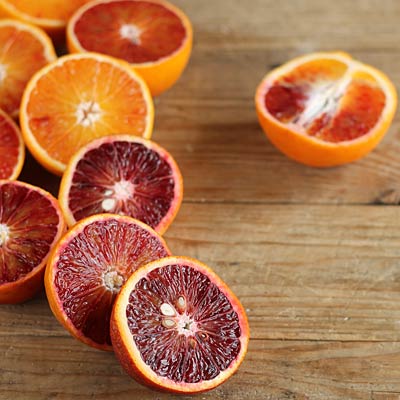
Blood Oranges
It's a good thing this produce pick is in season during the winter: with more vitamin C than their bloodless counterpart, they're a perfect quick defense against drama. In a study published in the journal Psychopharmacology,
German researchers attempted to stress out 120 people by asking them to
give a speech and then answer difficult math problems. Researchers
found that those participants who had been given high doses of vitamin C
before the stress-fest had lower blood pressure levels and
concentrations of the stress hormone cortisol.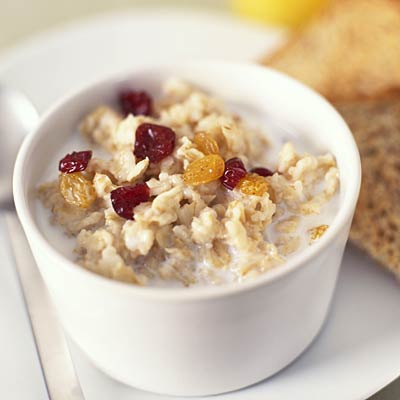
Oatmeal
A perky disposition depends on carbohydrates. Serotonin, your brain's
primary mood-boosting neurotransmitter, comes from the amino acid
tryptophan, which needs carbohydrates to reach the brain.
Problem is, as cute as Christmas cookies are, their refined carbs spur
an overproduction of insulin that's not only linked to sugar crashes but
spikes in stress hormones as well. Reach for warm and gooey oatmeal
instead. It contains the healthy carbohydrates and
fiber needed to boost your serotonin levels for a full three hours. 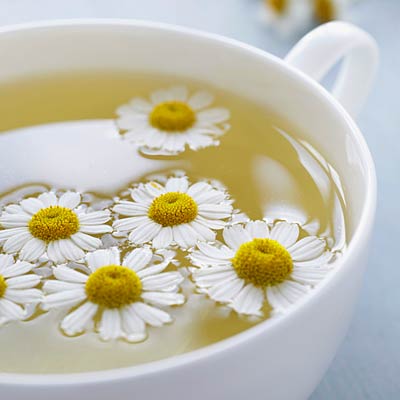
Chamomile Tea
Stress time is the perfect teatime. In a recent study from the University of Pennsylvania published in the Journal of Clinical Psychopharmacology,
adults with mild to moderate generalized anxiety disorder who took
chamomile extract for 8 weeks saw greater reductions in anxiety than
those who took a placebo. Plus, according to the University of Maryland
Medical Center, chamomile promotes sleep so that your body can get the
rest it needs to deal with stressors.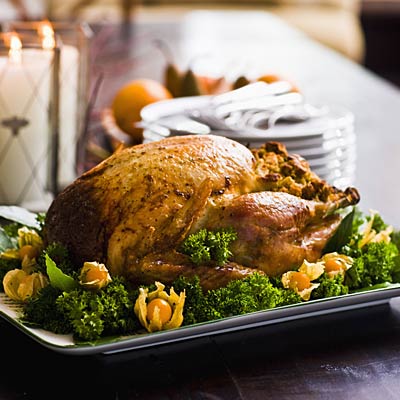
Turkey
Who cares about family feuds when they're coasting through a turkey
coma? That's because turkey contains high concentrations of tryptophan,
which is broken down to form serotonin to induce feelings of calm and
even help your body make drowse-inducing melatonin. But remember, if that tryptophan is going to reach your brain,
you need to pair it with some carbs.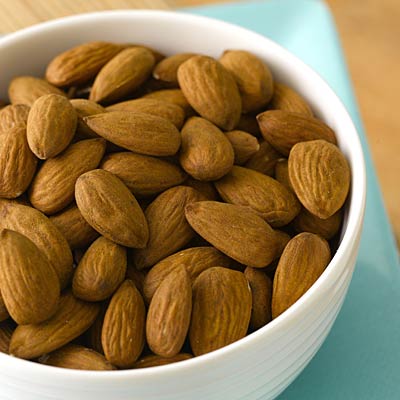
Almonds
What can't these little nuts
do? Almonds are brimming with vitamin E and B vitamins, which may
protect both your immune system and mood. A handful of almonds packs
about 20% of your daily-recommended intake of magnesium, which fights
free radicals in the body. Not getting enough magnesium can even cause
fatigue and trigger migraine headaches, says Gomer. And since, according
to the American Journal of Clinical Nutrition, nearly seven out
of 10 Americans don't get enough of the nutrient, it's a good bet that
low magnesium levels have you on edge. 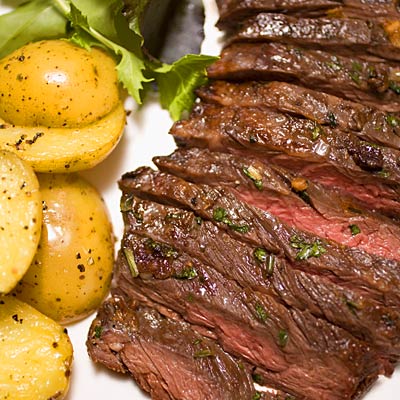
Grass-fed Beef
Happy cows make for truly happy meals. Grass-fed beef contains more
omega-3s and fewer omega 6s than its grain-fed counterpart, helping to
mediate mood-wrecking inflammation in the body. Plus, it's a great
source of the amino acid creatine, which can lift depression in women.
Researchers believe that by increasing the energy available to the
brain, creatine may help people better wrap their minds around problems.
The result: those problems feel a whole lot smaller.
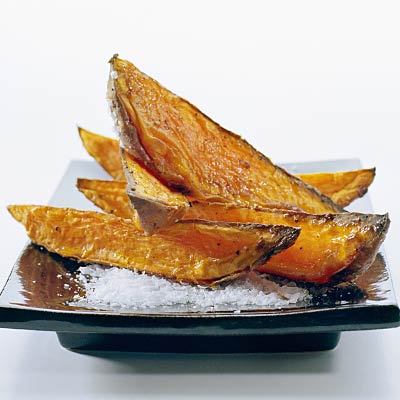
Sweet Potatoes
Here's a whole new reason to give thanks: With more nutrients than their
colorless cousin, sweet potatoes are an excellent source of the
antioxidant lycopene, which improves mood by preventing the formation of
pro-inflammatory compounds, like interleukin-6, that are linked to
depression. Sweet spuds are also high in
other mood enhancers like B6 and magnesium.
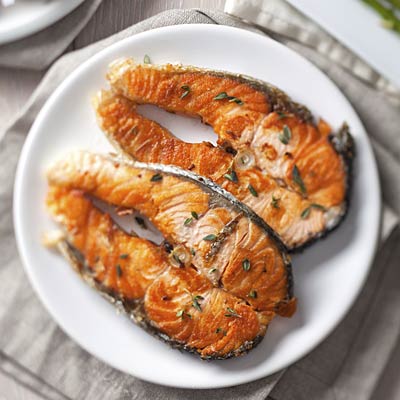
Salmon
All omega-3 fatty acids are good for you, but when it comes to battling
holiday stress, DHA and EPA are the ones you need. Found primarily in
fatty fish like salmon, they support healthy brain cell function,
endorphin levels, and positive moods by keeping cortisol and adrenaline
levels in check. Plus, just one serving of salmon contains
more than half of your recommended daily allowance of vitamin D, which
most women fail to meet during the winter because of a lack of sunlight.
One University of Texas study published in Mayo Clinic Proceedings
found that the lower your blood levels of vitamin D, the greater your
chance of having clinical depression.
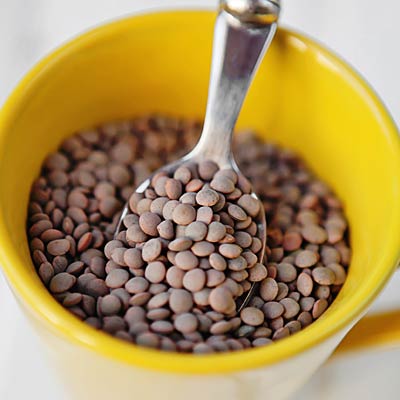
Lentils
Lentils are the perfect comfort food—and not just because they're
hearty, filling, and perfectly warm on cold winter days. They are also
packed with depression-fighting folate, which helps make serotonin and
dopamine, possibly explaining why up to half of people who suffer from
depression have low folate levels. Folate's so
important to mood that many anti-depressant medications even contain the
nutrient. If you find yourself experiencing more high-lows than
chronic lows, good news: lentils are also a great source of fiber, which
can help stabilize blood sugar levels and keep you from snapping under
stress. 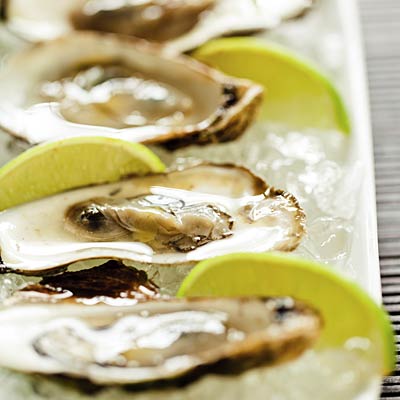
Oysters
These suggestive shellfish contain more than seven times the zinc per
serving of any other food. Why does it matter? Zinc deficiency can cause
depression and anxiety, and supplementation is an effective form of
treatment. If seafood isn't your thing, reach for cuts of beef
and poultry. While whole grains and fortified breakfast cereals also
contain zinc, their phytates can inhibit zinc's absorption in the body
and dull its effect.

No comments:
Post a Comment